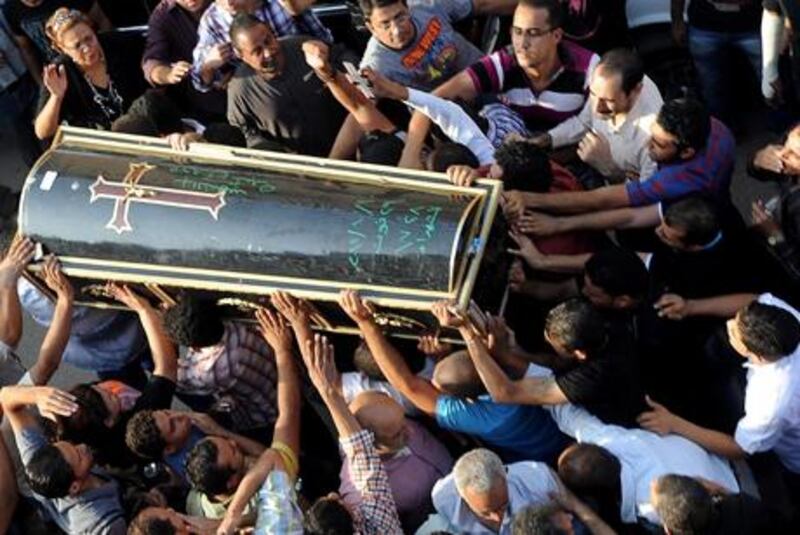CAIRO // Coptic Christians protesting outside a Cairo hospital pelted security forces with rocks yesterday in a second day of violence, the worst in Egypt since the uprising that ousted Hosni Mubarak from the presidency in February.
At least 26 people died and nearly 500 were injured on Sunday in protests that grew after an arson attack on a Christian church last month. Much of the anger yesterday was directed at the army, whom protesters accuse of bungling the response to street violence and refusing to say when it will hand over power to a civilian government.
"There is a lack of transparency from the government during this transitional period and the government and media are using religion as a tool for facing security problems," said Nabil Abdel Fattah, a researcher at Ahram Centre for Political and Strategic Studies.
Clashes broke out late on Sunday after thousands of Christian protesters marched from the Shubra area to Cairo city centre, where they tried to stage a sit-in outside the state television headquarters. Protesters say the march was peaceful until they were attacked by "thugs". A speeding military vehicle jumped onto the pavement, crushing some protesters. Online videos showed mangled bodies.
The latest clashes took place yesterday outside the hospital where victims had been taken the night before. Several hundred people held up wooden crosses and photos of those who had been killed, chanting "Peace, Peace" and calling for the removal of Field Marshal Mohammed Tantawi, the chairman of the Supreme Council of the Armed Forces and effectively Egypt's head of state.
Mr Tantawi has faced criticism for the army's inability to provide adequate security on the streets. For Essam Sharaf, the prime minister, the riots are a setback in the transition to civilian rule.
"Instead of moving forward to build a modern state on democratic principles, we are back to seeking stability and searching for hidden hands - domestic and foreign - that meddle with the country's security and safety," Mr Sharaf said.
Some protesters dismissed Mr Sharaf's claim of interference.
"Coptic problems have been used as a tool by the government to excite tensions for years, so we need to rebuild with different people in the government," said Yusuf Sami, a Copt who was donating blood at the hospital.
The violence has exacerbated fears of the country's Coptic minority in the face of increasingly politically active Salafists and other Islamist groups that were suppressed under Mr Mubarak.
"This result is an accumulation of political, social and religious tensions in Egypt, then the uprising of Islamist movements in the political sphere has added to fears that newcomers to the political scene may try to break up the fruits of the revolution," Mr Fattah said.
The Coptic Church claims 10 million followers, who are generally estimated to make up between 6 and 10 per cent of Egypt's population of 82 million.
Poorly represented in government, Copts complain they are sidelined from numerous posts in the justice system, universities and police. They also say they have been subject to stringent legislation regarding building churches. A church in Aswan was partly demolished last month after Muslim villagers claimed it violated construction codes. Egypt's Coptic Orthodox Church criticised the government yesterday.
"The Christian faith denounces violence. Strangers infiltrated the demonstration and committed the crimes for which the Copts have been blamed," the church said in a statement issued after the spiritual leader of the Coptic Christian minority, Pope Shenouda III, held a meeting with 70 church leaders.
Some protesters said they were fed up with what they saw as Christian leaders bowing to government pressure. "Each time, we protest for our human rights, and the pope and priests tell us to stop because the government complains to them," said George Iskander, a retired businessman protesting outside the hospital in Cairo.
Hundreds more gathered at a Christian Cathedral in Abayssia for the funerals of those killed in Sunday's violence. The pope declared three days of mourning, praying and fasting for the victims, starting today, and presided over funerals for some of the Christians killed.
There is no precise breakdown of how many Christians and Muslims were among the victims, but the 26 are believed to be mostly Christian.
Officials say three soldiers were killed, a number later questioned by activists. Egypt's official news agency said dozens of people had been arrested.
For some who attended the funerals yesterday, the misinformation and scale of violence raised worries about what may come.
"I'm here to mourn those killed by the military. They are Christian, but we are all Egyptians," said Asma Ali, a Muslim attending the service.





